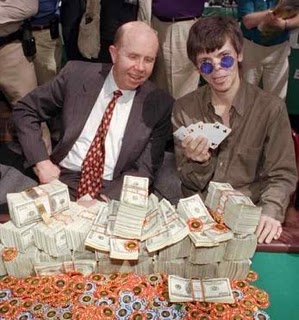Have you ever wondered whether the so many existing ‘poker pros’ who work as full-time poker player have a real job or just listed as unemployed? Or are they really Poker Professionals legally? Well, I’m telling you, they were not. Not until now, to be precise.
This is how pro poker players usually look like
An individual not to be named wrote a very interesting post on the popular Two Plus Two Forums concerning the same thing. He wanted to start a vocational school in California for the profession ‘Professional Poker Player’ when he realized such a job did not exist. Of course he didn’t surrender, contacted the government, exchanged a few emails, and now it’s a legit, real profession in the US according to the Department of Labor. How? Read his story below.
I quickly found out that there was no such federal listing for Professional Poker Player. Listed under amusement & recreation were “Gambling Monitor” code #343.367-014, “Gambling Dealer” code #343.464-010, “Card Room Attendant I (chip person) code #343.467-010 and “Card Player” (prop player employed by a casino) code 343.367.010. There was no title or code for a person whose sole source of income was as a self-employed professional poker player.
After several back-and-forth e-mails with the government analyst assigned to evaluate my request, it was submitted to their committee and approved. It was approved under the occupational title of “Athletes and Sports Competitors” code #27-2021.00. The definition of a Professional Poker Player is:
“Participates in competitive poker events, such as single table games and multiple table tournaments as his full-time occupation. Plays poker and engages in game conforming to established rules, betting, and regulations. Appraises each poker table or poker tournament as to the skill of other players. Keeps track of other poker player’s skill and betting habits. Has knowledge of poker-hand probabilities and bets accordingly. Has knowledge of poker playing money management. Interacts with other poker players at gaming tables or tournaments. Plays poker at single tables up to 12 hours a day or tournaments lasting for days. Must have the physical and mental endurance to concentrate for long hours of play. Must have the mathematical skills of poker strategy and probabilities. Must have the psychological skills to ‘read’ other poker players. Must have the ‘poker feel’ of knowing who and when to ‘bluff.’ Must have the knowledge of the rules of the poker game he is playing."

